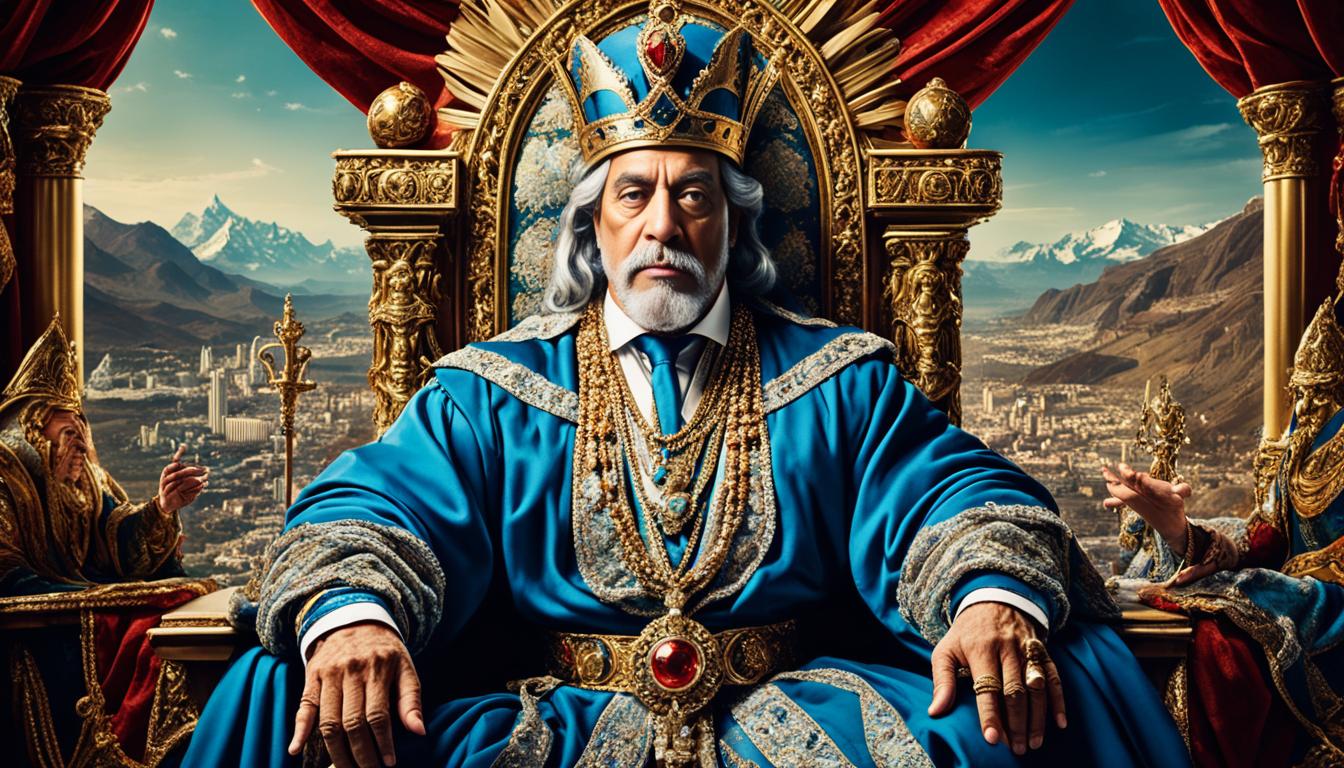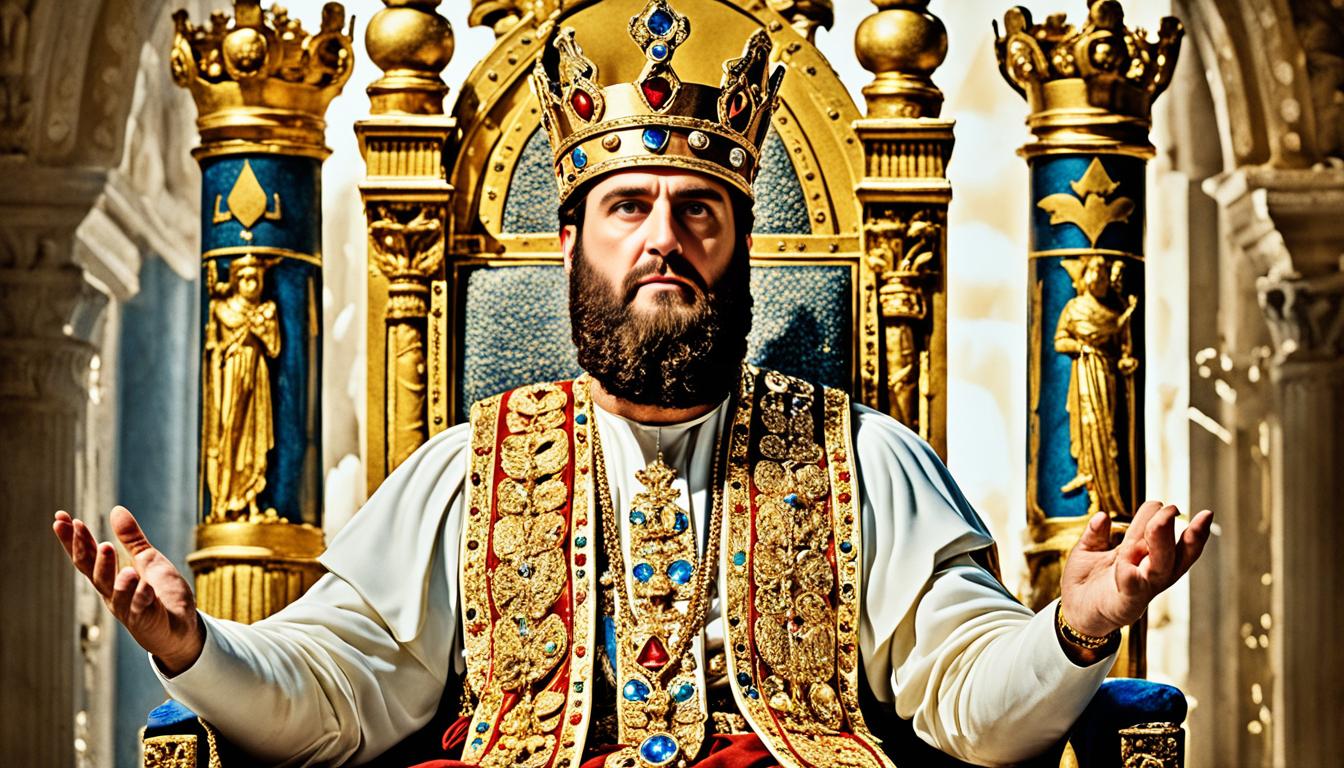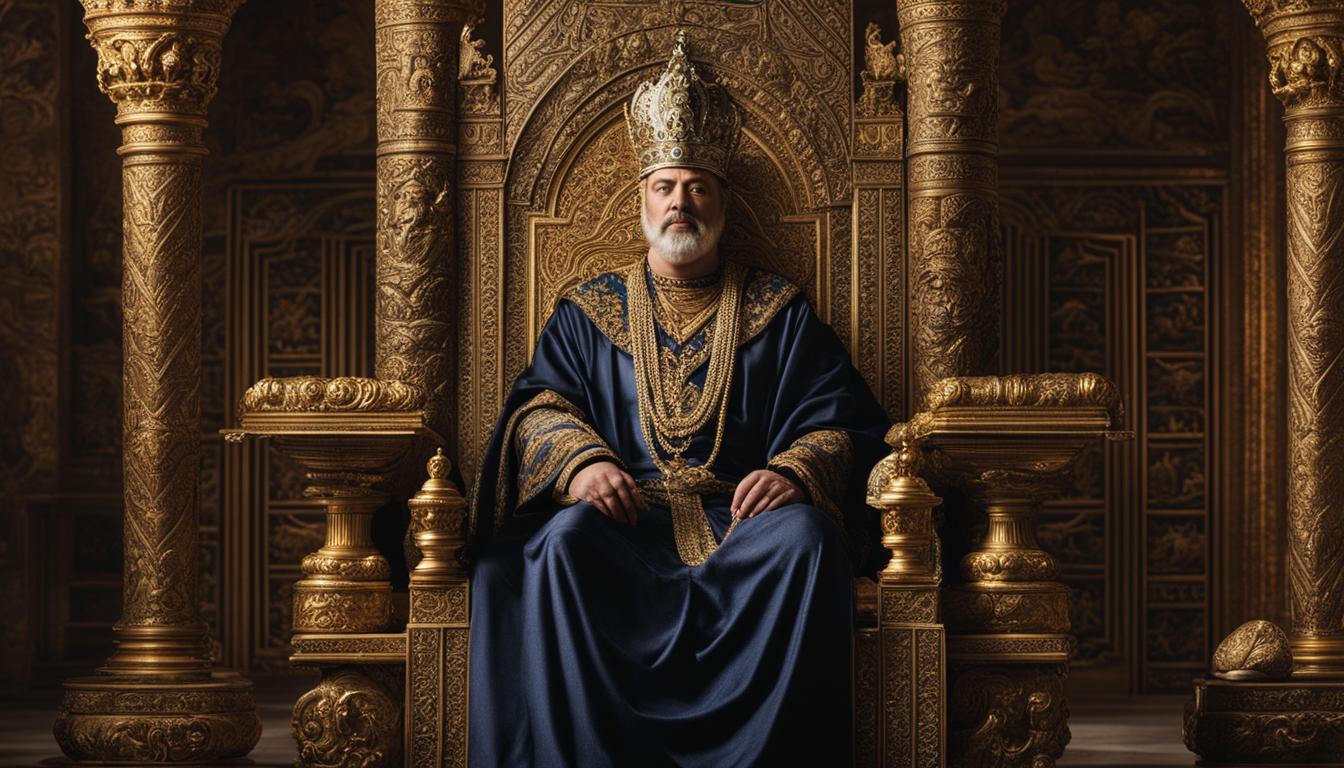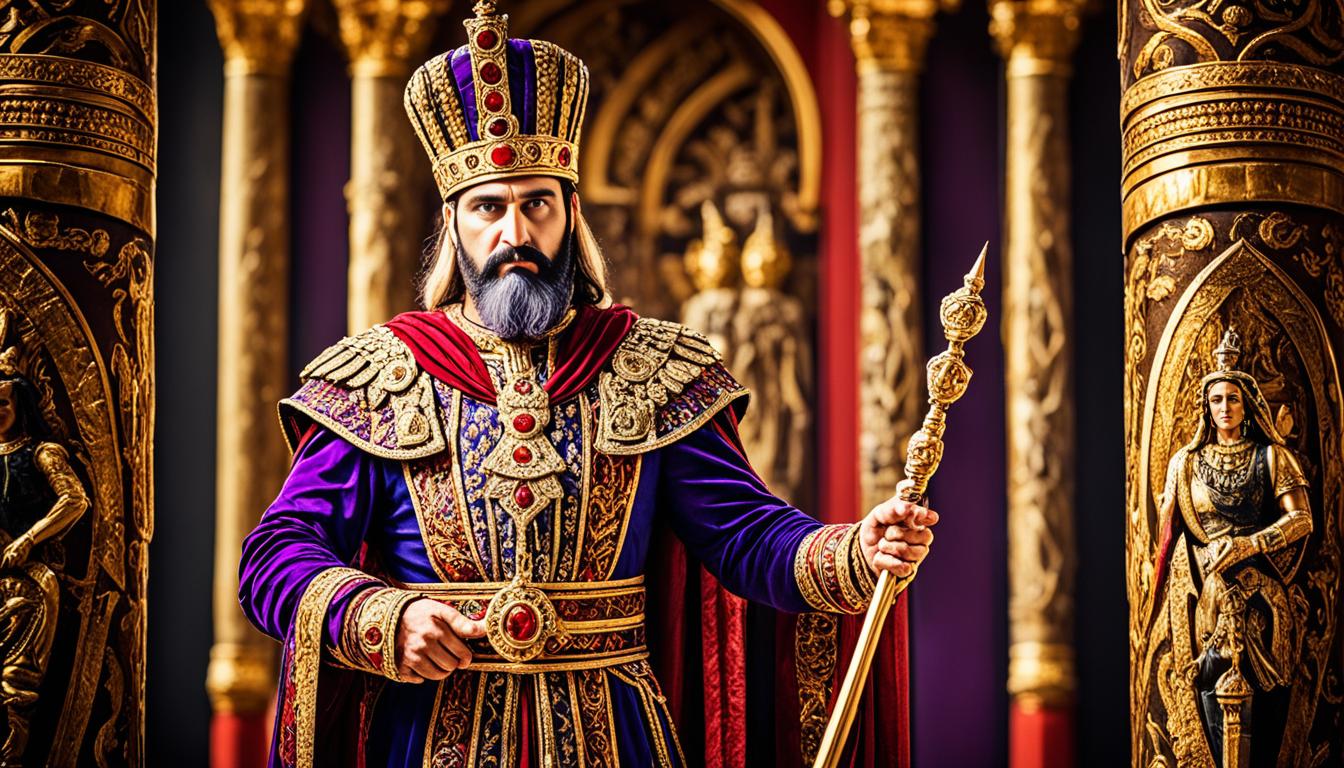King Darius, also known as Darius the Great or Darius the Mede, was an enigmatic figure in biblical history. He played a significant role in the events described in the Old Testament, particularly in the book of Daniel. In this article, we will delve into the historical significance of King Darius and explore his role in Daniel’s tale.
- King Darius is mentioned in the Bible and played a significant role in biblical history.
- He is known as Darius the Great or Darius the Mede.
- Darius’s role in the book of Daniel is crucial to the narrative.
- We will dive deeper into the historical significance and explore his impact.
- Stay tuned as we unravel the fascinating story of King Darius.
King Darius in the Book of Ezra
According to the Book of Ezra, King Darius played a crucial role in the rebuilding of the temple in Jerusalem. The Jewish people, who had been allowed to return from their Babylonian captivity by Cyrus, faced opposition in their efforts to reconstruct the temple.
Tattenai, the governor of the province Beyond-the-River, expressed doubts about the legitimacy of the project and sent a letter to King Darius to question it. In response, Darius ordered a search of the royal archives, where the decree of Cyrus allowing the temple’s reconstruction was found. King Darius affirmed the decree and even went a step further by ordering that the rebuilding be funded from the royal treasury.
To ensure the project’s success and discourage any interference, King Darius issued a stern warning. Anyone who attempted to hinder the temple’s reconstruction would face the punishment of death by impaling.
Rise to Power and Reign of Darius the Great
Darius the Great, although not the rightful heir to the Persian throne, rose to power after eliminating an imposter named Gaumâta, who had falsely claimed the position as the brother of the deceased Cambyses, the legitimate successor. Darius emerged as one of the most influential Persian rulers, embarking on a series of military campaigns that expanded and consolidated the vast Persian Empire. His administrative prowess allowed him to reorganize the empire into new satrapies, ensuring efficient governance and stability.
Moreover, Darius’s ambitious building projects stand as a testament to his grand vision for the empire. Notably, he spearheaded the construction of a magnificent new capital at Persepolis, showcasing the architectural marvels and cultural glory of the Persian civilization.
During his reign, Darius also focused on enhancing trade and transportation networks by developing land and sea routes, facilitating communication and commerce across the empire. His strategic initiatives catapulted the Persian Empire to new heights of prosperity and global influence.
“Darius the Great demonstrated remarkable leadership capabilities, strategically expanding the empire through military conquests, implementing effective administrative systems, and leaving behind enduring architectural wonders.”
Military Campaigns of Darius the Great
| Year | Campaign |
|---|---|
| 518 BC | Subjugation of the Indus Valley |
| 512 BC | Conquest of Thrace and Macedon |
| 502 BC | Suppression of the Ionian Revolt |
| 499 BC | Subjugation of Naxos and Eretria |
| 498 BC | Conquest of Samos and Cyprus |
Through his military triumphs and visionary governance, Darius the Great established an enduring legacy, shaping the course of the Persian Empire and leaving an indelible mark on world history.

Darius the Mede and the Fall of Babylon
There has been some confusion regarding the identity of Darius the Mede mentioned in the book of Daniel. Recent insights from cuneiform texts suggest that Darius the Mede may have been another name for Gubaru, the governor under Cyrus who appointed sub-governors in Babylonia after its conquest. Gubaru ruled over Babylonia, Syria, Phoenicia, and Palestine and was referred to as the “governor of Babylon and the Region Beyond the River.” He held a subordinate position to Cyrus but was still called “king” in Daniel. This understanding aligns with historical context and clarifies the role of Darius the Mede in the fall of Babylon.
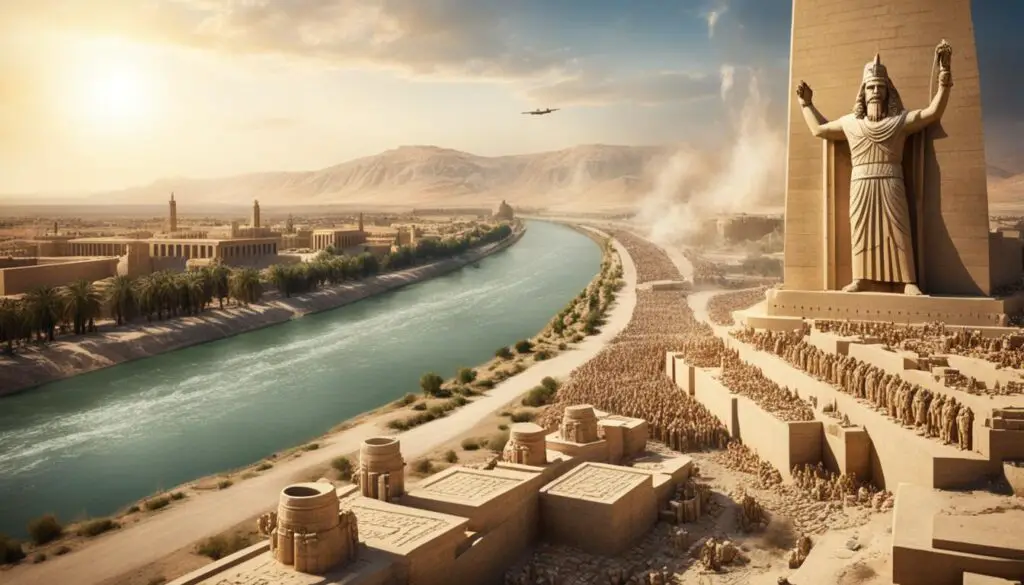
During the fall of Babylon, Darius the Mede played a crucial role in the transition of power. As the governor of Babylonia, he took command after the city was conquered by Cyrus the Great. While his rule may not have been as prominent or well-known as that of Cyrus, his impact on the historical narrative should not be overlooked.
“You shall be over the kingdom of Babylon, and you, Darius, shall set up the royal insignia and rule the kingdom…”
This quote from the book of Daniel highlights the recognition and authority bestowed upon Darius the Mede during his brief reign in Babylon. Despite his subordinate position to Cyrus, he was given the title of “king” and entrusted with the governance of the conquered kingdom.
By identifying Darius the Mede as Gubaru, the governor under Cyrus, we gain a clearer understanding of the political dynamics surrounding the fall of Babylon. Gubaru’s appointment of sub-governors in Babylonia demonstrates his role in the administration of the conquered territory, further solidifying his significance in the historical accounts.
Darius the Mede and the Fall of Babylon: Key Points
- Darius the Mede is mentioned in the book of Daniel in relation to the fall of Babylon.
- Recent insights suggest that Darius the Mede may have been another name for Gubaru, the governor under Cyrus.
- Gubaru ruled over Babylonia, Syria, Phoenicia, and Palestine and held a subordinative position to Cyrus.
- Darius the Mede’s role in the fall of Babylon was crucial in the transition of power.
- Identifying Darius the Mede as Gubaru clarifies his significance in the historical narrative.
King Darius in the Book of Esther and Other Biblical References
King Darius, a prominent figure in biblical history, also makes an appearance in the book of Esther. Here, he plays a crucial role in the events surrounding Queen Esther and the miraculous deliverance of the Jewish people from a plot to annihilate them. The story tells us that when Esther approached King Darius with her request for intervention, he extended a golden scepter, signifying his favor and granting her an audience. This act of mercy and the authority Darius wielded foreshadow his significance in biblical history.
King Darius’s appearance in the book of Esther showcases the power and influence he held as a ruler. His favor towards Esther not only saved her life but also paved the way for the Jews’ eventual triumph over their enemies. This moment exemplifies Darius’s authority and highlights the importance of his role in biblical narratives.
In addition to the book of Esther, references to King Darius can be found in other biblical passages. One such reference includes quotes from his royal decree in the book of Daniel, emphasizing his significance and influence during his time. These various biblical mentions solidify King Darius’s place in history and highlight his impact on the course of events.
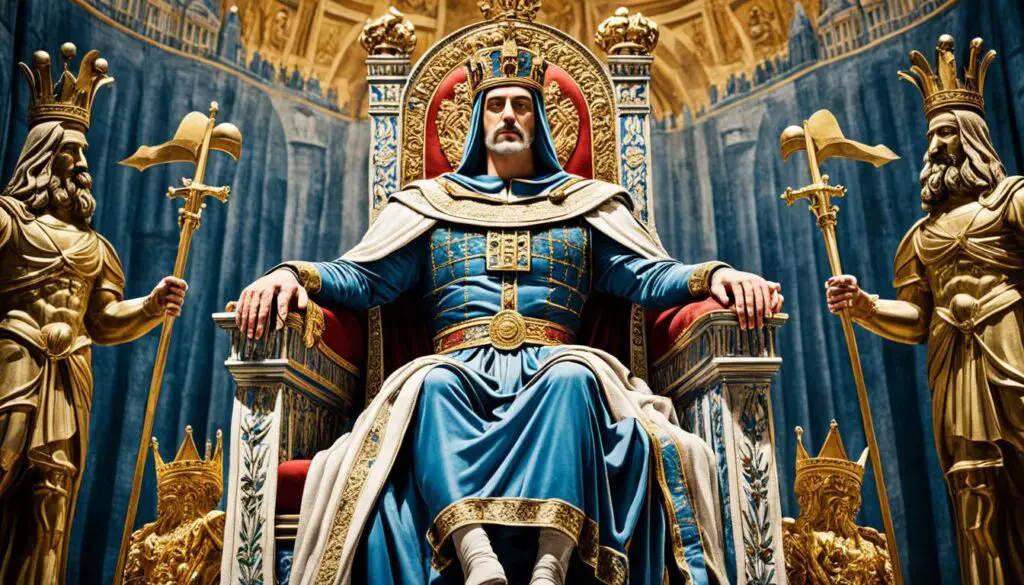
King Darius’s role in the book of Esther and his references in other biblical books underline his authority, significance, and lasting legacy. The events surrounding his interactions with Queen Esther reveal his compassion and power, ultimately changing the course of history for the Jewish people. His involvement in biblical narratives solidifies King Darius as a prominent figure whose impact and influence will forever be remembered.
Legacy and Death of Darius the Great
Darius the Great holds a prominent place in history for his contributions to the Persian Empire. His reign symbolized a period of expansion, prosperity, and transformation. Darius implemented significant administrative reforms that laid the foundation for an efficient and organized empire. His ambitious building projects showcased his grand vision and left a lasting architectural legacy.
Darius the Great ruled over the Persian Empire from 522 BC until his death in November 486 BC. His leadership and strategic prowess allowed him to establish a stable empire that spanned vast territories, including present-day Iran, Egypt, and parts of Central Asia.
To commemorate his greatness, Darius the Great’s final resting place is a testament to his enduring legacy. Carved into a cliff at Naqsh-e Rustam, his tomb stands as a remarkable architectural marvel. This site serves as a powerful reminder of his influential rule and the impact he had on ancient Persia.
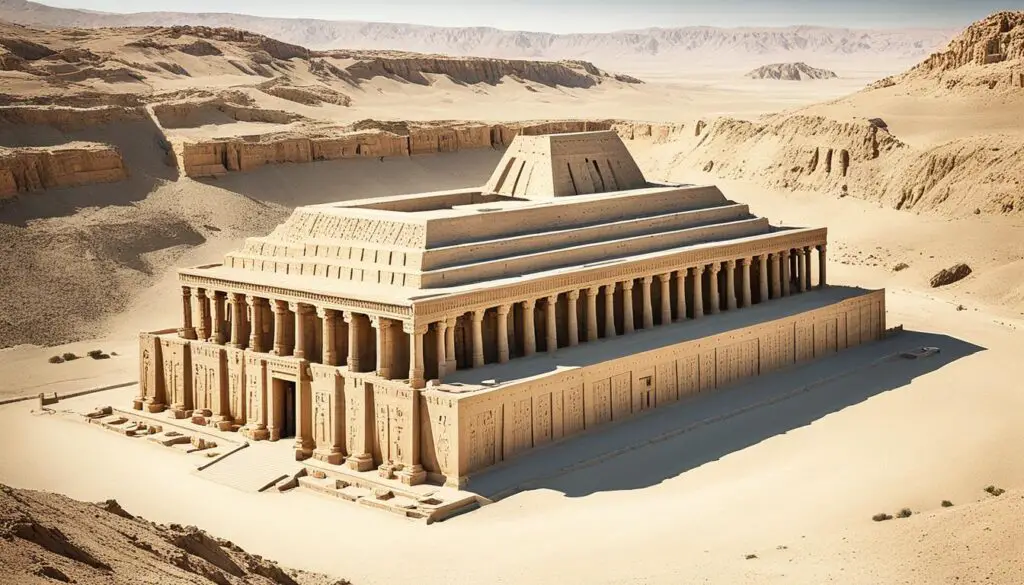
Darius the Great’s Persian Empire
The Persian Empire under Darius experienced remarkable growth and prosperity. One of his notable accomplishments was the establishment of a well-defined administrative structure. Darius divided the empire into various satrapies or provinces and appointed loyal governors to ensure efficient governance and resource management.
In addition to his administrative reforms, Darius the Great spearheaded ambitious building projects that showcased the empire’s wealth and grandeur. Notably, he constructed the magnificent capital city of Persepolis, which stood as a symbol of Persian power and cultural richness.
Darius the Great’s Enduring Influence
Even after his death, Darius the Great’s influence continued to shape Persian history and culture. His administrative reforms laid the groundwork for future Persian rulers and solidified the empire’s strength and stability. The architectural marvels he left behind served as a source of inspiration for subsequent generations.
Darius the Great’s legacy extends beyond the Persian Empire. His reign and achievements have been studied and admired by historians and scholars, who recognize him as one of the most influential and significant Persian rulers in history.
Conclusion
King Darius, whether as Darius the Great or Darius the Mede, holds a significant place in biblical history. His role in the events described in the book of Ezra and the book of Esther showcases his authority and impact on the Jewish people. In the book of Ezra, King Darius played a crucial role in the rebuilding of the temple in Jerusalem, affirming the Jewish people’s right to reconstruct their sacred place of worship. In the book of Esther, his act of mercy towards Queen Esther contributed to the deliverance of the Jews from a plot to annihilate them.
Darius the Great’s rise to power and reign as the Persian king brought stability and expansion to the empire. His military campaigns, administrative reforms, and ambitious building projects solidified his legacy as a great ruler. He reorganized the Persian Empire into new satrapies, developed land and sea routes, and constructed remarkable structures such as the capital at Persepolis. Darius the Great’s historical significance cannot be overstated, as he played a pivotal role in shaping the ancient world.
As we explore the biblical accounts of King Darius, we gain insights into the rich tapestry of history and the impact of powerful individuals. King Darius’s presence in the Bible provides a glimpse into the socio-political dynamics of ancient civilizations and highlights the historical significance of biblical narratives. Whether through his decrees in the book of Daniel or his actions in the book of Esther, King Darius’s influence reverberates throughout biblical history, leaving a lasting legacy that continues to fascinate and captivate us to this day.
FAQ
Who was King Darius in biblical history?
King Darius, also known as Darius the Great or Darius the Mede, was an enigmatic figure in biblical history. He is mentioned in the book of Daniel and played a significant role in the events described in the Old Testament.
What was King Darius’s role in the book of Ezra?
According to the book of Ezra, King Darius played a crucial role in the rebuilding of the temple in Jerusalem. He affirmed the decree of Cyrus allowing the temple’s reconstruction and even ordered that the rebuilding be funded from the royal treasury, threatening anyone who tried to interfere with death by impaling.
How did Darius the Great rise to power?
Darius the Great was not the rightful heir to the Persian throne. He came to power after killing an imposter named Gaumâta who had usurped the throne. Darius went on to become one of the greatest Persian rulers, expanding and consolidating the empire through a series of military campaigns.
Who was Darius the Mede in the fall of Babylon?
Recent insights from cuneiform texts suggest that Darius the Mede may have been another name for Gubaru, the governor under Cyrus who appointed sub-governors in Babylonia. Gubaru ruled over Babylonia, Syria, Phoenicia, and Palestine and was referred to as the “governor of Babylon and the Region Beyond the River.”
How does King Darius feature in the book of Esther?
King Darius plays a significant role in the events surrounding Queen Esther and the deliverance of the Jews from a plot to annihilate them. Darius held out a golden scepter to Esther, granting her favor and allowing her to live.
What is Darius the Great’s legacy?
Darius the Great left a lasting legacy on the Persian Empire. His reign marked a period of expansion and prosperity, and he is remembered for his administrative reforms and ambitious building projects.
What is the historical significance of King Darius?
King Darius, whether as Darius the Great or Darius the Mede, holds a significant place in biblical history. His role in the events described in the books of Ezra and Esther showcases his authority and impact on the Jewish people. Furthermore, his rise to power and reign as the Persian king brought stability and expansion to the empire, shaping the ancient world.
